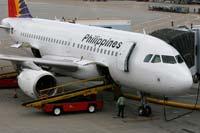Banned airline serves growing Filipino community in Canada

Philippine Airlines, which flies into Vancouver daily has been banned from the skies over Europe but will continue its operations in Canada.
Airline officials in Manila and at the Vancouver international airport said it is business as usual in North America after the European Union’s executive banned all airlines from the Philippines last week from flying into Europe, arguing that their safety standards were too unreliable.
Europe’s airspace is tightly monitored to prevent accidents, with almost 300 airlines from around the world banned from flying there.
Philippine Airlines (PAL), Asia oldest flag carrier, has a daily Manila to Vancouver to Las Vegas, back up to Vancouver and on to Manila operation.
It serves the growing Filipino-Canadian community and a huge influx of temporary foreign workers that seek jobs in Western Canada. Philippines is one of the largest sources of foreign workers in Canada, after the U.S.
The airline expanded its operations one year ago in Canada just as bigger operations like Singapore Airlines and Cathay Pacific cutback on their cross-Pacific routes. It flies to 31 international and 30 domestic destinations.
“I have no concerns about safety with PAL,” said Herman Gomez, a Vancouver-based Filipino construction worker.
“I have taken it several times…the only complaint I have is the food could be better,” he said.
Many Filipino-Canadians said Europe’s move to ban their national carrier was excessive.
“I think they have a better safety record than many other airlines,” said Juanita Lingan at the Vancouver Airport.
“I love their Las Vegas to Vancouver flight…it’s easy to get and cheap,” said the waitress.
European Commission spokeswoman Helen Kearns told journalists in Brussels said the new ban covers over 40 Philippine airlines and a dozen Sudanese ones.
“In both (new) cases, it’s because of persistent and serious non-compliance by the civil aviation authorities in terms of overseeing and checks on aircraft,” she said.
The commission said in an accompanying briefing paper that it “acknowledges” efforts by the Philippine authorities to improve their safety standards and was “ready to support” further reforms, but was “forced to follow the principle of precaution.”
Airlines from 14 countries are now totally banned in the European Union: Benin, the Democratic Republic of Congo, Djibouti, Equatorial Guinea, Indonesia, Kyrgyzstan, Liberia, the Philippines, Congo, Sierra Leone, Sao Tome and Principe, Sudan, Swaziland and Zambia.
Responding to the ban, Philippine Airlines in statement said it is gravely concerned over “the unfortunate inclusion of PAL and all other local carriers in the EC blacklist.”
“PAL would like to assure the riding public that safety remains the bedrock of PAL’s operations. It has always been the flag carrier’s policy to ensure that its passengers fly with the full assurance of safety and comfort.”
The airline attributed the European decision to the U.S. Federal Aviation Administration’s (FAA) decision in January 2008 downgrading the Philippines’ safety rating to Category 2 and the “significant safety concern” findings by the International Civil Aviation Organization (ICAO) in November 2009.
“But despite the Philippines’ Category 2 rating, it must be noted that the U.S. FAA continues to allow PAL to operate up to 33 regular weekly flights from the Philippines to Los Angeles, San Francisco, Honolulu, Las Vegas and Guam. PAL safely flies thousands of passengers, including U.S. citizens, across the Pacific Ocean on a regular and reliable basis in compliance with stringent U.S. safety regulations, “ the PAL statement noted.
It welcomed the European Commission’s decision to visit the Philippines so that aside from Philippine aviation regulators, it can also inspect and audit local carriers.
“PAL is prepared for such audit and is confident that EC inspectors will find a picture of PAL as a world-class carrier of uncompromising professionalism and efficiency,” the airline said.
Alfonso G. Cusi, director-general of the Civil Aviation Authority of the Philippines (CAAP), said officials from the EU’s Safety Aviation Commission would be asked to conduct an inspection sometime in May.
He said the EU decision was not unexpected, and that Philippine authorities had in fact made representations that local standards had been upgraded.
PAL’s low-cost unit Airphil Express said in a separate statement that it “assures the riding public that our planes are well maintained and adhere to a strict maintenance policy that puts a premium on passenger comfort and safety.”
Budget carrier Cebu Pacific, for its part, said it supports the actions of the CAAP to further improve civil aviation in the country. It also issued assurances regarding the safety of its aircraft.









